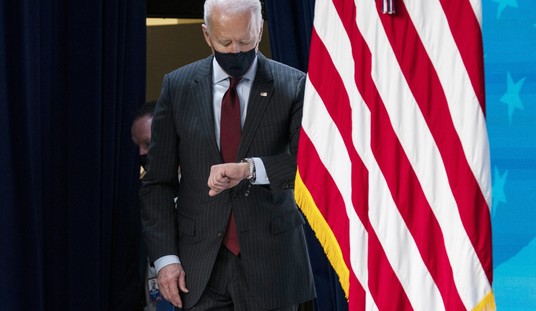The phenomenon of conflation occurs
when the identities of two or more individuals, concepts, or places, sharing some characteristics of one another, become confused until there seems to be only a single identity — the differences appear to become lost.
Michael Ledeen’s torture article at Pajamas Media — presented amid the capture and execution killing of Osama bin Laden, through the use of information some of which was apparently obtained through “torture” — shows the need for introspection. In addition to providing an example of conflation, as noted in many of the comments, it raises many questions. Among the answerable: Should we forbid all forms of “torture?” Should the Justice Department continue its investigation of “torture,” begun in 2009? “‘It’s unfortunate,’ Cheney said. ‘These men deserve to be decorated. They don’t deserve to be prosecuted.’” Should we continue to vent our self-righteous distaste for “torture” on those who obtained the bin Laden information (and, through its use, further important information) until they stop doing it? It was written here that
We have witnessed crimes against humanity. We want President Obama to show complete commitment to the rule of law so that the many lying, corrupt and criminal Americans from both the public and private sectors that have caused so much harm are punished. That includes Bush, Cheney, Rumsfeld and many, many others in the Bush administration, including those that were supposed to regulate the financial sector.
I disagreed here. What is “torture”? Are the slow removal of sensitive body parts in the most painful manner possible, on the one hand, and sleep deprivation by playing awful music at high volume in close proximity, on the other, both “torture”? Or does that term properly apply only to the former? Since the same word is applied to both, are they equally bad? What about waterboarding? It’s quite unpleasant and no parlor game, even though it causes only transitory fear and discomfort. Perhaps, with the copious publicity about its transitory nature, it has become less effective than previously.
“Torture” seems to occur along a spectrum rather than as one discrete band of activity. Perhaps a prism is needed to separate the various activities into discrete bands. We do that with light. Every point along the spectrum of visible light is by definition visible and there is light at every such point. The conflation of these points involved in simply calling them all “light” is harmless, unless perhaps one is working in an old fashioned darkroom developing photos, where low intensity red light can be used to see without damaging the negative or print but high intensity blue light can’t.
By sad contrast, many quite broad spectrum words and their underlying concepts have fallen prey to conflation: racism, poverty, genocide, promiscuity, and torture, for example. We can learn here, as in many other left-oriented articles, just how widespread “racism” is: all opposition to President Obama’s policies and initiatives is “racist.” “Poverty” is no less widespread; the word is used as applicable to both the United States and Haiti and all places in between. In Haiti, 40.6 percent of the workforce of 4.81 million are unemployed and eighty percent of the population exist below the “poverty line” (2003 estimate — it is likely worse now). Not having a color television and an automobile seems, in the United States, to be associated with poverty. Not so in many other countries. Genocide is a term often applied to Israel’s activities in trying to keep Palestinians from sending missiles and terrorists into Israel to kill Jews and anyone else in their way as well as to the activities at German death camps during World War II’s Holocaust. Promiscuity suggests flagrant sexual conduct, but that means many different things to many different people, particularly when it is done to mock religion. That’s true of many activities. Even threatening to burn a Koran is viewed by some as terribly bad because it sets off massacres among Islamists, but burning a Bible or soaking one in urine is hardly even newsworthy because Christians and Jews aren’t likely to go on killing sprees on account of it.
Torture — now there’s a biggie, at which some but not all of our enemies have been experts or at least vigorous and experienced. Being taken captive by the Vietcong during the Vietnam conflict could be an horrific experience and many tortured survivors still have harsh mementos. Sometimes captives were tortured to get information, sometimes for vengeance and, most likely, sometimes just for the fun of it. I have heard that some Native American tribes fancied placing captured enemies spreadeagled and naked on anthills and spreading honey on their genitals — not for information but vengeance. This sort of thing is patently uncivilized, as we commonly use that term, and it is simply inconceivable that the United States would ever to do anything even remotely similar. On the other hand, Germany was thought to represent a pinnacle of civilization until the horrors of the “final solution” were widely revealed.
I intentionally used the word “torture” in the preceding paragraph to include things done to extract information from an unwilling subject as well as things done for other purposes to suggest what I hope is obvious, that there are different contexts and that they should be treated differently. Using the word “torture” indiscriminately in the contexts of interrogation and other activities misses the point, confuses the subject, and leads to worse than silly conclusions. Some of the activities at the Abu Ghraib prison in Iraq were apparently engaged in quite illegitimately and solely for amusement (people sometimes go to jail for doing that sort of thing to non-human animals), but, on other occasions, quite legitimately to extract information. Sometimes the amusement and information extraction may have merged; if so that is very unfortunate. Many of those complicit in the entertainment were court-martialed and punished when the allegations became matters of public knowledge. It simply was not and should not be the sort of conduct tolerated by the United States. That does not suggest, however, that some “enhanced” interrogation techniques illegitimately used for entertainment must not be used, legitimately, for interrogation.
How about evaluating torture to extract information from an unwilling subject by reference to a three-dimensional spectrum with the following parameters of unknowns: Let (x) be the likely importance of the information sought, (y) the severity of the methods probably necessary to get it, and (z) the time remaining before it becomes too late. This could be difficult for a number of reasons; in addition to being unknown, the parameters may not be linear functions. In addition, all three parameters are somewhat subjective, but that’s true of lots of qualifiers and even some quantifiers — and that, in turn, is why experienced and skilled personnel, well aware of the constraints under which they are to function, are needed, and why they sometimes have to factor their gut feelings into their calculations. Sometimes they screw up, but holding them liable in light of facts unknown when they acted is likely to increase the likelihood of screw ups.
Never having had to extract information which might or might not be used to prevent multiple deaths or worse from someone unwilling to provide it, and having no training in the process, I wouldn’t know where or how to start or to stop. I probably wouldn’t be able to determine whether someone had the information to be sought, whether it could or couldn’t be obtained through gentle persuasion, or whether such information as he might have would be current or otherwise useful. Any list of things I am incompetent to do would be very long, and among the items on it would be judging — in advance and on the basis of incomplete and probably inaccurate information — the propriety of “enhanced information gathering techniques” as proposed to be applied in hypothetical circumstances. If the advance information were complete and accurate, such questions might not even arise. A successful after-the-fact outcome might suggest that it was OK, but how about failure — no useful information and death or permanent disability of the subject? Should that require that the interrogator be punished? I would probably be incompetent to make that judgment as well.
The bottom line appears to be that abstract speculation and discussion are interesting but don’t necessarily provide satisfactorily useful guidance for specific situations, particularly in the fog of war where they often occur. For example: the jerk’s wife told us that he knows where IEDs are hidden and how and when they will be exploded. He refused to tell us. Should we give him an enema or start pulling fingernails or teeth? Be impolite and suggest that he eats like a pig? How about loud music? How about CSPAN straight at high volume until he cracks? How about starting to burn a Koran? A Bible? Get to work on one of his buddies? His daughter? His wife? His lover? Put him in a room alone with food and drink but no human contact until he cracks? Use for that purpose a room adjacent to one from which recordings of (simulated) weeping, wailing and gnashing of teeth and an occasional scream of pain followed by pregnant silence can be heard? The possibilities and permutations of possibilities are probably almost endless. As Mr. Ledeen states, “It’s not a simple matter, not at all.”
Mr. Ledeen concludes,
So I don’t have an easy answer, the best I can do is this: in general, no torture, or anything that comes close to it. Go with other methods. Be willing to pay a price on the battlefield on those (rare) occasions when torture would have worked faster and saved some lives. But in those instances when the stakes are high, when the usual, civilized methods just won’t do, then you have to consider all the options. And be willing to stain your soul. You chose to get into this, after all. That’s part of the price.
I have no basis in personal experiences permitting factual agreement or disagreement with the thesis that there are only rare battlefield occasions when “torture” would (as distinguished from “could”?) have saved the day, but it just seems odd and to require an extraordinary sense of after-the-fact prescience. It seems far odder to accept that even transitory discomfort for an enemy operative undergoing “anything that comes close” to “torture” is worse than the death, injury, and/or capture of members of our military — for which we should be unwilling to pay the price lest our souls be stained. “We,” of course, or many of us, are at home watching sitcoms or President Obama expound upon his glories. Very few of “we” are out on the field of battle voluntarily taking significant risks of having to pay the price in their own special way. They pay that price on behalf of the ubiquitous “we,” while trying to survive to continue to do the same the next day and the days after.
Much the same could be said about insisting that “our side” play by what we consider the proper rules even when the other side does not. Gone perhaps are the days when if one side played by the established rules the other side could be counted on to do so as well. Does anyone really think that if we play by our rules Islamic terrorists will also follow them? Imagine a football game in which the Redskins had to play against a team of savages, free to play by its own rules: if they knife the Redskins quarterback, that’s OK, but the Redskins mustn’t do it. If an enemy takes prisoners and “tortures” them, that’s OK, but our guys mustn’t do that sort of thing — or anything close to it. War is not a game and there’s no such thing as a lovely war; all are very unpleasant.
Our rules of engagement should recognize this unpleasant reality. And it’s not funny.
Are our souls actually “stained” by every use of every form of “torture, or anything that comes close to it,” to prevent human deaths, injuries, and captures by “sullen peoples, half-devil and half-child”? Are we to avoid that stain as we vicariously continue to carry what Kipling referred to as The White Man’s Burden? That’s a “racist” poem of course, but it’s what we have been doing for a very long time, albeit under similar circumstances but very different names. If we are willing to avoid that stain, perhaps Mr. Ledeen is correct.
I doubt that many of us are willing to countenance the avoidable sacrifices of those honorably and voluntarily doing our bidding, at the risk of their lives, merely in the interest of not “staining” our souls. I doubt even that many are willing to accept any avoidable sacrifices of “innocent civilians” for that reason.
I submit that the concluding thesis advanced in Mr. Ledeen’s article is not quite right: we stain far more darkly such squeamish souls as we may have by being so much in love with them that we are prepared to put our agents and others at mortal risk while refusing to permit them to do what is necessary to shield themselves, us, and others from avoidable and horrific consequences — as they go about the duties we sent them to perform on our behalf. If we are are willing to accept far darker stains such as these, then we had best treat the rest of the word as too unpleasant for us and retreat; to where I don’t know, because the unpleasantness may follow us even at home, as has happened in the not far distant past. When this bloody war is over? It may be a very long time. Running and trying to hide are not always good survival strategies.








Join the conversation as a VIP Member